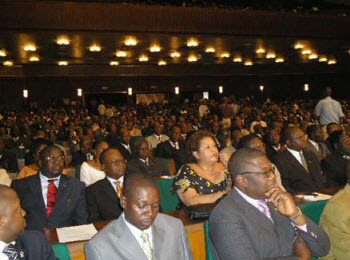The PPRD lost nearly half the number of seats it held in the 500-seat National Assembly, winning only 63 seats. The PPRD had more candidates than any other party in the elections.
Etienne Tshisekedi’s Union for Democracy and Social Progress (UDPS) won 42 seats. Mr. Tshisekedi, who is contesting the results of the parliamentary and presidential elections, has called on members of his party to boycott the parliament. The UDPS had no members in parliament after boycotting the 2006 elections.
The relatively unknown People’s Party for Peace and Democracy (PPPD), which is allied to the PPRD, has emerged from the elections as the third biggest party in the National Assembly after winning 29 seats.
The Lumumbist Party (PALU), led by former Prime Minister Antoine Gizenga and current Prime Minister Adolphe Muzito, also lost seats after winning only 19.
Jean-Pierre Bemba’s Movement for the Liberation of Congo (MLC), which was the main opposition party in parliament, won 22 seats. Vital Kamerhe’s Union for the Congolese Nation (UNC) won 18 seats.
Although Mr. Kabila will have a comfortable majority in the National Assembly thanks to the Presidential Majority (MP), a parliamentary grouping of parties supporting his agenda, the results are a setback for the ruling PPRD, which was aiming to increase its seats in parliament to lessen its dependence on its allies.
The new balance of power will affect how Mr. Kabila forms any new government. As the biggest party allied to the PPRD until now, the PALU has been given the prime minister’s post since the 2006 elections.
Mr. Kabila is said to consider including members of the opposition in a new government. Altogether, opposition candidates were credited with winning more votes than Mr. Kabila in the presidential election. They have rejected the results published by the electoral commission, alleging widespread fraud.
The electoral commission said it asked the Supreme Court to nullify results for 17 seats in 7 districts affected by violence on voting day.
More than 19,000 candidates run for parliament. The Supreme Court has received more than 500 appeals since the electoral commission started publishing partial results. The Electoral Law gives the court two months to decide on the appeals.
Related articles
- • DR Congo Citizens Head to Polls to Elect President, Members of Parliament (December 20, 2023)
- • Felix Tshisekedi Sworn In as DR Congo President (January 24, 2019)
- • Constitutional Court Declares Tshisekedi Winner of Presidential Election (January 19, 2019)
- • Martin Fayulu Challenges Presidential Election Results in Court (January 12, 2019)
- • Felix Tshisekedi Vows to Be the President of All Congolese (January 10, 2019)
- • Martin Fayulu Rejects Presidential Election Results (January 10, 2019)
- • Felix Tshisekedi Elected DR Congo President (January 10, 2019)
- • DR Congo Delays Results of December Election (January 6, 2019)
- • Bemba, Katumbi renew their support for joint opposition presidential candidate Fayulu (November 16, 2018)
- • Vital Kamerhe also withdraws support for joint opposition presidential bid (November 12, 2018)
- • Felix Tshisekedi withdraws support for joint opposition presidential bid (November 12, 2018)
- • Oppositioin leaders pick Martin Fayulu as joint presidential candidate (November 11, 2018)
- • Jean-Pierre Bemba banned from running for president (August 25, 2018)
- • Vital Kamerhe named UNC presidential candidate (August 4, 2018)
- • Bemba says Katumbi should be allowed to run for president (August 4, 2018)
- • Moise Katumbi blocked from entering DR Congo (August 3, 2018)
- • Jean-Pierre Bemba Returns to DR Congo (August 1, 2018)
- • Jean-Pierre Bemba named MLC presidential candidate (July 13, 2018)
- • Botswana Urges Joseph Kabila to Step Down (February 26, 2018)
- • No elections in DR Congo in December without electronic voting machines: INEC (February 13, 2018)
- • US Warns DR Congo Against Electronic Voting for Delayed Election (February 12, 2018)
- • Presidential election scheduled for December 23, 2018 (November 5, 2017)
- • Felix Tshisekedi accuses INEC of illegally prolonging Kabila's mandate (October 24, 2017)
- • DRC Seeks Arrest of Presidential Candidate Moise Katumbi (May 19, 2016)
- • Papa Wemba Is Buried in Kinshasa (May 4, 2016)
- • Papa Wemba Awarded Highest National Honor as Thousands Pay Tribute (May 2, 2016)
- • Political tensions 'running high' in DR Congo ahead of 2016 elections (October 7, 2015)
- • Rights Groups: DR Congo Must Free Pro-democracy Activists (April 13, 2015)
- • Electoral commission sets DR Congo presidential election date (February 12, 2015)
- • Police Open Fire on Crowd Protesting Election Law Change (January 19, 2015)









